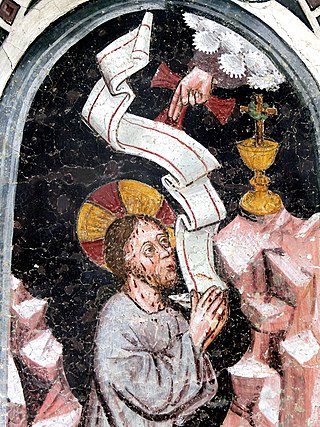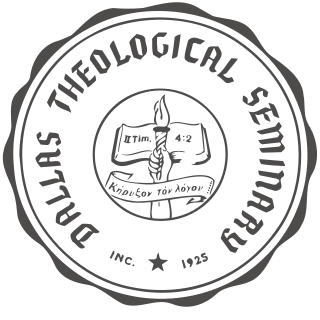
Sola scriptura is a Christian theological doctrine held by most Protestant Christian denominations, in particular the Lutheran and Reformed traditions, that posits the Bible as the sole infallible source of authority for Christian faith and practice. The Catholic Church considers it heresy and generally the Orthodox churches consider it to be contrary to the phronema of the Church.

A spiritual gift or charism is an extraordinary power given by the Holy Spirit. These are believed by followers to be supernatural graces that individual Christians need to fulfill the mission of the Church. In the narrowest sense, it is a theological term for the extraordinary graces given to individual Christians for the good of others and is distinguished from the graces given for personal sanctification, such as the Seven Gifts of the Holy Spirit and the fruit of the Holy Spirit.
Christian fundamentalism, also known as fundamental Christianity or fundamentalist Christianity, is a religious movement emphasizing biblical literalism. In its modern form, it began in the late 19th and early 20th centuries among British and American Protestants as a reaction to theological liberalism and cultural modernism. Fundamentalists argued that 19th-century modernist theologians had misunderstood or rejected certain doctrines, especially biblical inerrancy, which they considered the fundamentals of the Christian faith.
The following outline is provided as an overview of and topical guide to Christian theology:

Anabaptist theology, also known as Anabaptist doctrine, is a theological tradition reflecting the doctrine of the Anabaptist Churches. The major branches of Anabaptist Christianity agree on core doctrines but have nuances in practice. While the adherence to doctrine is important in Anabaptist Christianity, living righteously is stressed to a greater degree.

Richard Duane Warren is an American Baptist evangelical Christian pastor and author. He is the founder of Saddleback Church, an evangelical Baptist megachurch in Lake Forest, California. Since 2022, he is executive director of the Finishing the Task mission coalition.

Dallas Theological Seminary (DTS) is an evangelical theological seminary in Dallas, Texas. It is known for popularizing the theological system of dispensationalism. DTS has campuses in Dallas, Houston, and Washington, D.C., as well as extension sites in Atlanta, Austin, San Antonio, Nashville, Northwest Arkansas, Europe, and Guatemala, and a multilingual online education program. DTS is the largest non-denominational seminary accredited by the Association of Theological Schools.
Liberal Christianity, also known as liberal theology and historically as Christian Modernism, is a movement that interprets Christian teaching by taking into consideration modern knowledge, science and ethics. It emphasizes the importance of reason and experience over doctrinal authority. Liberal Christians view their theology as an alternative to both atheistic rationalism and theologies based on traditional interpretations of external authority, such as the Bible or sacred tradition. It is thus a deviation from both the historic orthodox church and the Historical Jesus, as Biblical scholar and adherent EP Sanders freely acknowledges.
Biblical infallibility is the belief that what the Bible says regarding matters of faith and Christian practice is wholly useful and true. It is the "belief that the Bible is completely trustworthy as a guide to salvation and the life of faith and will not fail to accomplish its purpose."
Postliberal theology is a Christian theological movement that focuses on a narrative presentation of the Christian faith as regulative for the development of a coherent systematic theology. Thus, Christianity is an overarching story, with its own embedded culture, grammar, and practices, which can be understood only with reference to Christianity's own internal logic.
Prosperity theology is a religious belief among some Charismatic Christians that financial blessing and physical well-being are always the will of God for them, and that faith, positive scriptural confession, and giving to charitable and religious causes will increase one's material wealth. Material and especially financial success is seen as an evidence of divine grace or favor and blessings.

David Harold Chilton (1951–1997) was an American pastor, Reconstructionist, speaker and author of several books on economics, eschatology and Christian Worldview from Placerville, California. He contributed three books on eschatology: Paradise Restored (1985), The Days of Vengeance (1987), and The Great Tribulation (1987).
John Dwight Pentecost was an American Christian theologian, best known for his book Things to Come.
Wayne Edward Oates was an American psychologist and religious educator who is often - incorrectly - considered to have coined the word 'workaholic'.
Robert Bunger Thieme, Jr. was pastor of Berachah Church, a nondenominational Christian church in Houston, Texas, from 1950 to 2003. Affectionately called "the Colonel" by his congregation, he was a dispensationalist theologian who wrote over a hundred books and conducted over 10,000 sermons on various theological topics during his 55 years as a pastor.
Christianity and domestic violence deals with the debate in Christian communities about the recognition and response to domestic violence, which is complicated by a culture of silence and acceptance among abuse victims. There are some Bible verses that abusers use to justify discipline of their wives.
John Jefferson Davis is Professor of Systematic Theology and Christian Ethics at Gordon-Conwell Theological Seminary, where he has taught since 1975. He is an ordained Presbyterian pastor.
The Evangelical Methodist Church of America Christian denomination based in the United States. Ardently Fundamental, the denomination has its roots in a movement of churches that broke away from Mainline Methodism in the 1940s and 50s.
Elizabeth Rice Achtemeier was an American ordained Presbyterian minister, Bible professor, and author.
The New Independent Fundamental Baptist Movement is an association of rightwing King James Only, independent Baptist churches. The New IFB began with Steven Anderson of Faithful Word Baptist Church in response to perceived liberalism in other independent Baptist churches. The New IFB does not consider itself to be a denomination. As of 2019, the New IFB listed 32 affiliated congregations on its website, most in the US with some in Australia, Canada, the Philippines and South Africa.






